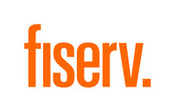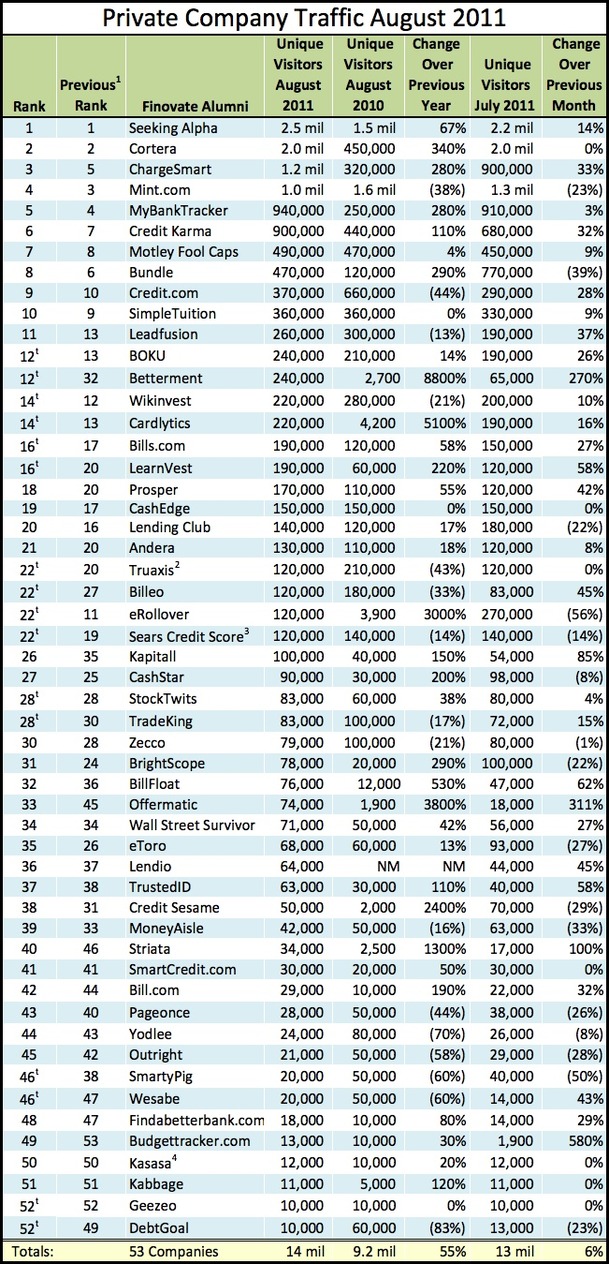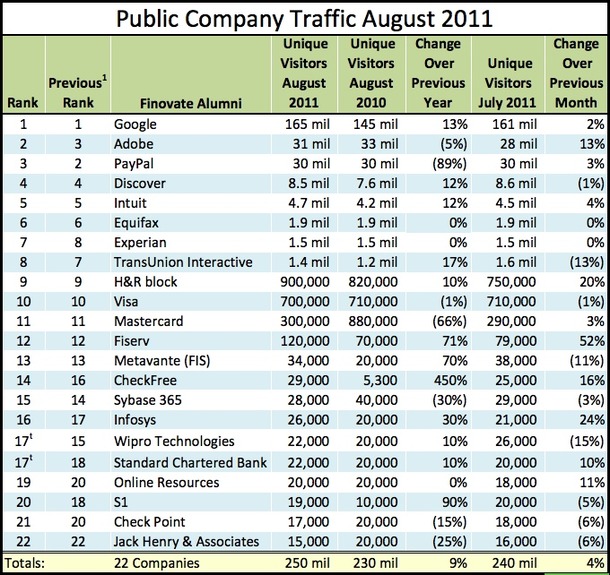Here’s a look at press coverage from FinovateSpring 2012 in San Francisco last week. For comprehensive coverage, be sure to check out Erin McCune’s live blog on PaymentsViews, which covers all 63 presenting companies:

2 Minute Finance
2MF @ Finovate Spring 2012 Conference
by Bobby Lee
Link
BillGuard Demo @ Finovate Spring 2012 Conference (Day 1)
by Bobby Lee
Cardlytics Demo @ Finovate Spring 2012 Conference (Day 1)
by Bobby Lee
Concur Demo @ Finovate Spring 2012 Conference (Day 1)
by Bobby Lee
Flint Mobile Demo @ Finovate Spring 2012 Conference (Day 2)
by Bobby Lee
Mitek Systems Demo @ Finovate Spring 2012 Conference (Day 1)
by Bobby Lee
TIO Networks Demo @ Finovate Spring 2012 Conference (Day 1)
by Bobby Lee
WattzOn Demo @ Finovate Spring 2012 Conference (Day 1)
by Bobby Lee
Bank Innovation
5 Finovate Demo-ers’ News Catching Our Eye
by Mary Wisniewski
4 More Finovate Products We Like
by Mary Wisniewski
Bank Technology News
Best of Finovate Spring Day 1
by Penny Crosman
Best of Finovate Spring Day 2
by Penny Crosman
Dwolla Pitches Fast Fund Transfers, but Bank Participation is Vital
by Sean Sposito
Edo to Harness Payment Data to Spur Consumer Spending
by Victoria Finkle
WattzOn Helps Banks Help Customers Save on Energy Bills
by Sean Sposito
BankersLab Blog
CreditLab Launch: Reactions and Responses
BankNXT
Finovate, Simple, and Re-Imagining Banking Applications
by Bradley Leimer
Live at FinovateSpring 2012- day 1
by Jelmer de Jong
Live at FinovateSpring 2012- day 2
by Jelmer de Jong
BetaKit
CoverHound Debuts Comparison Tool for Auto Insurance
by Cheronne Thurab
Business Insider
Finally, a Mobile App That Helps You Save Money: Meet Urge
by Willy Staley
Business2Community
What Does $4.6 Billion in Coupon Savings Have to Do with Savvy Consumers?
by Andre Bourque
C’est pas mon idée!
FinovateSpring 2012: quoi de neuf?
by Patrice Bernard
Currency Marketing Blog
Four Conference in Four Days
by Tim McAlpine
Credit Union Times
MoneyDesktop Named Best of Show at FinovateSpring Conference
by Natasha Chilingerian
Daily Disruption
Flint Mobile Announces Beta Launch at Finovate and Closes $3 Million Round of Financing
by Tim Rygh
The Daily Guardian (BillGuard’s blog)
Financial Community Awards BillGuard Best Of Show at Finovate
by Maryanne
DCisions Blog
DCisions at Finovate Spring 2012
by Kritika Ashok
Des Moines Register
Dwolla offers software for free
by Adam Belz
Des Moines Register Blog
Dwolla, Social Money earn praise at national banking conference
by Marco Santana
Exc
elsior
Kuspit, el primer Finovate mexicano
by Alicia Salgado
Experian Blog
Business IQ Express… what is the media saying?
by Roslyn Whitehurst
FamZoo Blog
Finovate Winners
by Bill Dwight
Finextra
Flint taps phone cameras for card payments
SoMoLend closes $1.17 million seed round
Forrester Blog
Finovate Spring 2012: Digital Financial Services Innovation
by Tiffani Montez
FP Pad
[Video Spotlight] inStream Solutions CEO Alex Murguia at FinovateSpring 2012
by Bill Winterberg
[Video Spotlight] iQuantifi CEO Tom White at FinovateSpring 2012
by Bill Winterberg
[Video Spotlight] Sarah Carter of Actiance at FinovateSpring 2012
by Bill Winterberg
Iconowatch
Accelerating Innovation at Finovate 2012
by Hans Eisenbeis
Investment News
Personal Capital launches iPhone app
by Davis Janowski
Lazy Man and Money
What’s Hot and What’s Not from Finovate 2012
Mercury News
Money Goes Mobile
Montreal Gazette
Montreal’s Wall Street Survivor teaches about investing
by Jason Magder
MyBankTracker
Can FinTech Stop You from ‘Showrooming?’
by Willy Staley
MoneyDesktop: How Personalized Deals Shine in PFM Tools
by Simon Zhen
Save Your Wallet, and Maybe the Planet, with WattzOn
by by Willy Staley
On Deck Capital Blog
Photo Journal: Our Finovate Demo
PaymentsNews
Highlights from Finovate Spring 2012 San Francisco
PaymentsViews
Live Blogging Finovate Spring 2012 San Francisco
by Erin McCune
The Paypers
ZipZap rolls out CashCade payment service
PaySimple Blog
PaySimple at Finovate
by Sarah Jordan
PC World
New Web Apps and Services for Business
by Yardena Arar
QuidLabs
Finovate Best in Show
by Aliisa Rosenthal
SecurityPark.net
BehavioSec voted ‘Best of Show’ for biometric solution by audience at Finovate Spring, San Francisco
Silicon Prairie News
With upgraded FiSync, Dwolla cuts 3-5 day wait to real-time
by Michael Stacy
Silver Tail Systems Blog
Finovate Spring Demonstrates a Growing Richness in Online Interactions
by Laura Mather
Social Lending Network
Roundup of Social Lending News – May 12, 2012
by Peter Renton
TechCrunch
Capital One Snags Mobile Savings Startup BankOns, Team Moving To Capital One Labs
by Sarah Perez
Flint: A New Mobile Payment App For Small Businesses Picks Up $3M From Storm, True Ventures
by Ingrid Lunden
How Personal Capital Wants To Bring Money Management Into The Internet Age [TCTV]
by Colleen Taylor
Nearing The 1M User Mark, Expensify Adds ‘Trips’ Feature To Mobile Apps
by Colleen Taylor
The Anti-Groupon? Edo Launches Real-Time Local Offers Platform, Tied To Your Bank Card For Instant Credits
by Sarah Perez
Tradestreaming
List Of Winners Of Top Fintech Conference, Finovate
by Zack Miller
World News (wn.com)
Instream Solutions Ceo Alex Murguia At Finovatespring 2012
 Metaforic unveils Latest Software Protection Technology.
Metaforic unveils Latest Software Protection Technology.




















 Source: Compete.com retrieved the week of October 26, 2011
Source: Compete.com retrieved the week of October 26, 2011


 The FinTech 100, a list of the top revenue-grossing fintech firms, was announced Wednesday at
The FinTech 100, a list of the top revenue-grossing fintech firms, was announced Wednesday at 

